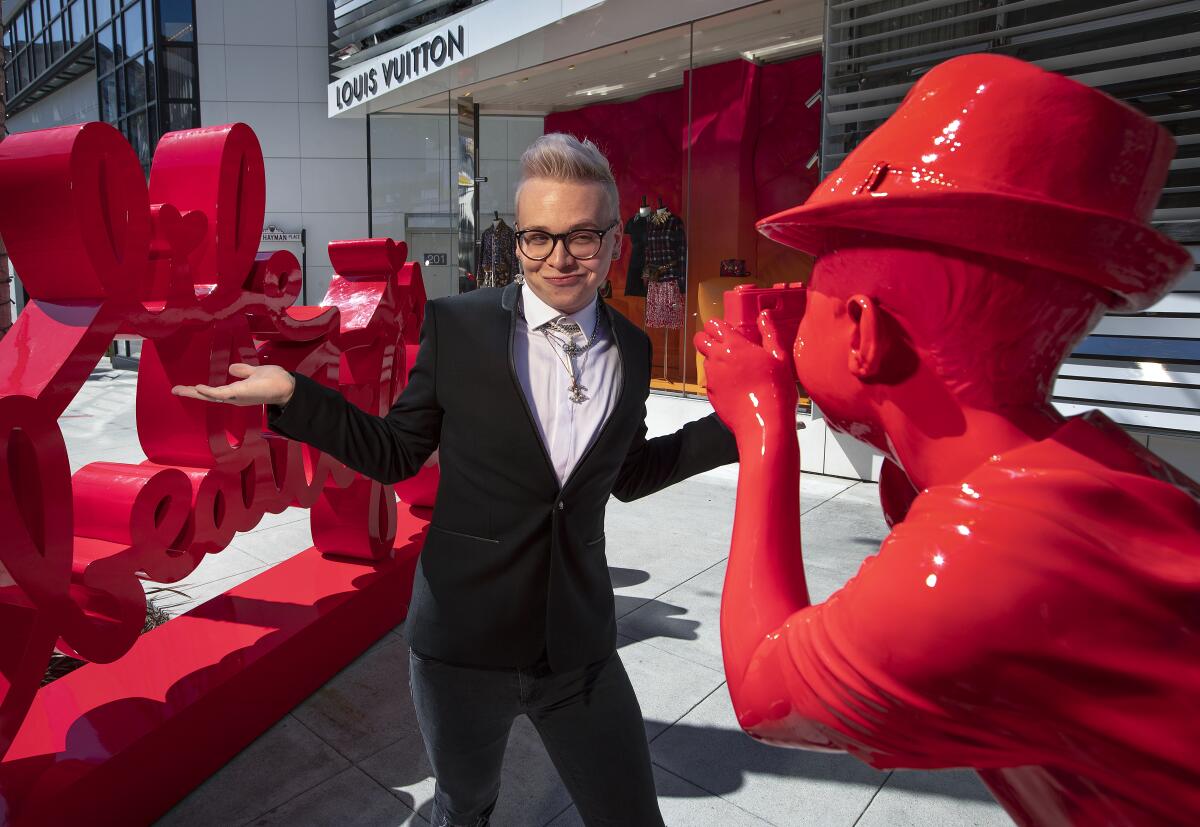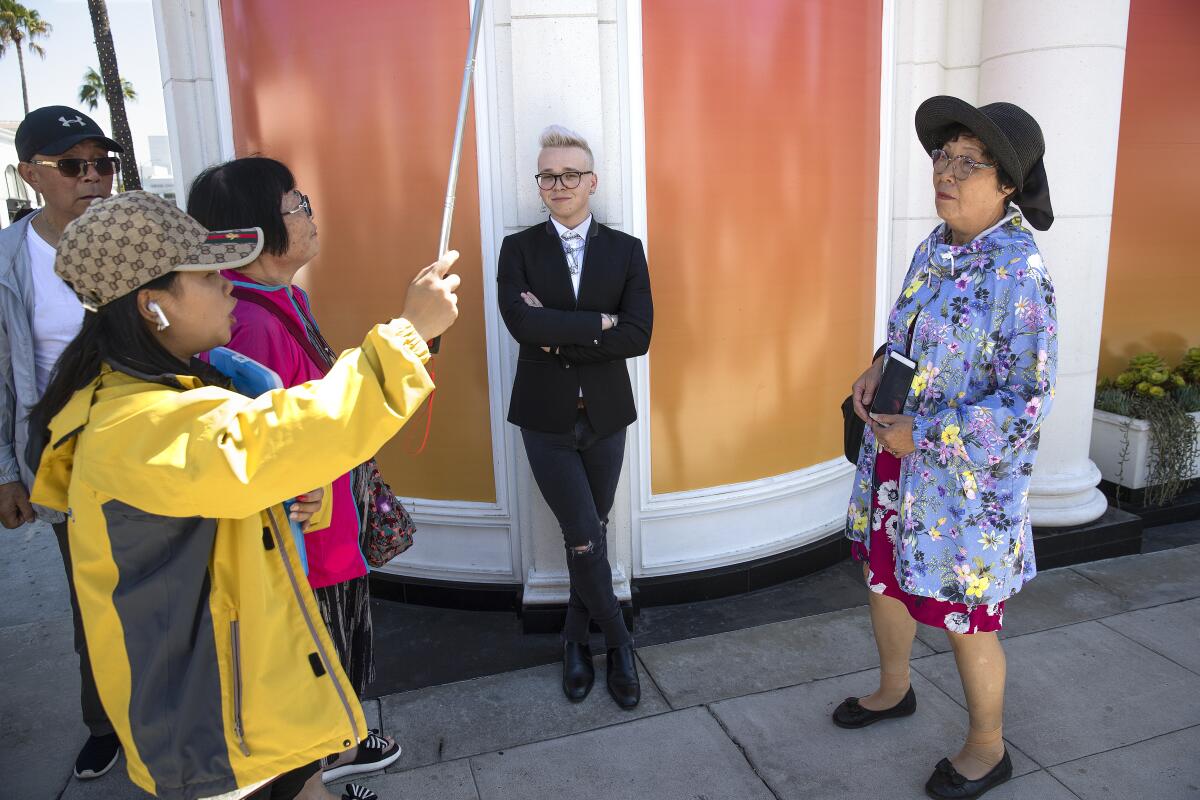How do you make money off social media? Just ask ‘Jawline’s’ star

- Share via
“Excuse me?” Michael Weist asked, flagging down a waiter. “Can we get some waters and some service? That would be, like, amazing.”
The 23-year-old talent manager was sitting at the pastel-infused Ladurée, which he’d billed as “airy and casual,” one of his favorite places to take clients in Beverly Hills. But it had been 10 minutes, and a server had yet to approach. He glanced at his assistant and photographer a few tables over, noticing them enjoying ice-cold lemonades.
“I would love something to drink, but apparently we’re just, like, chopped liver,” he told his employees. One of them picked up his glass and brought it over to Weist, who took a sip and promptly declared: “That is horrible.”
You don’t need to spend long with Weist to understand why he’d make a fascinating documentary subject. He’s always blunt and sometimes rude, constantly dressed in a uniform of designer wares. At the French cafe, he was sporting a Cartier bracelet and rings, a Chanel necklace and earrings and Christian Louboutin dress shoes.
He’s also polarizing. By 19 he was already one of the most successful managers in the social media space, steering the careers of YouTubers with millions of followers such as Bryce Hall and Mikey Barone. By 21 those same clients had turned on him, accusing him of sexual assault. Weist sued the two young men for defamation, and the parties ultimately reached a settlement, with Hall and Barone issuing a public apology.
But the drama didn’t stop there. In 2018, Weist partnered with YouTuber Tana Mongeau to create a convention called TanaCon — an event that was supposed to rival VidCon, the popular annual celebration of digital creators. But TanaCon was a Fyre Festival-level disaster. Thousands of fans turned up at an Anaheim hotel only to wait in the sun for hours without food or drink, ultimately turned away when the event was canceled due to overcrowding.
Weist took a public and private beating: He lost so much money from the fiasco that his company, Good Times Entertainment, was forced to declare bankruptcy last October.

But almost all of this turmoil unfolded after the cameras had stopped rolling on “Jawline,” the Hulu documentary out this weekend in which Weist is one of the main characters. The film, directed by newcomer Liza Mandelup, is a deep dive into the world of social media fame. Much of the story is focused on Austyn Tester, a 15-year-old from rural Tennessee who spends his days uploading videos to YouNow in the hopes of becoming a star.
But the other part of the tale unfolds in Los Angeles, where Weist is operating his company out of a rented Laurel Canyon mansion that he shares with a few of his young male clients. Mandelup captures him mixing business and pleasure, one day shopping with Barone on Rodeo Drive, the next in the house berating Barone for starting a video with a gender pronoun that he felt would alienate male fans.
“He can come off as harsh at times, but I do feel like he’s a really good person,” said Mandelup, who met Weist at VidCon in 2016 and began filming him shortly after. “It’s the aggressive nature of how much he wants to be a businessman that makes him extremely cutthroat. He can be almost cold, at times, but I don’t think that’s actually who he is.”
Weist began dreaming of making it big as a teenager growing up in Nashville. His mother was the real estate agent for the Kings of Leon, and he used the connection to start DJing for the band at private events and on tour. He was 17 and simultaneously spending a lot of his time on the now-defunct app Vine. One day while scrolling through 7-second videos, he noticed how many fans were commenting that they’d love to meet their favorite Vine stars in person.
“I thought: ‘What if I DJ for social media stars?’” said Weist, now happily drinking sparkling water with lime. “I thought I’d do an event called ‘Party With the Viners’ where I DJed and got their fans to come. I put it online and we had $30,000 worth of tickets sold out in 30 seconds.”
The event was a success, so he began hosting more, and at 17, he’d already made six figures and bought a Cadillac with cash. Still, he decided to attend college, studying music business and entrepreneurship at Belmont University. But he wasn’t pleased with the education he was getting for his money.
“These teachers were telling us how to get verified online and I was like, ‘Have you ever even sat down with Instagram? Because I have, and what you’re saying is not making sense,’” he recalled. “‘You should not be teaching me. I should be teaching you.’ I told that to one of their faces, and it did not work out well. I was like, ‘Thank you for helping me realize that I can learn nothing from this.’”

So as a sophomore he dropped out and decamped to L.A., living out of the W Hollywood for a few months until he could find his own place. He would direct-message potential clients on Instagram, asking if they were seeking representation and telling them how he could package their content “with a bow and sell it.” As his business grew, he established minimums: Weist won’t work with anyone who doesn’t have 10% engagement. In other words, if you have 100,000 followers, each one of your posts needs to have 10,000 likes.
“I’ve sat down with Instagram many times and asked, ‘What are the keys? What can we do to help provide a level of authenticity and some kind of quality control in this industry?’” Weist explained. “If everybody is famous, nobody is famous. If Influencer A goes to Nike and says I’ll do it for $1,000, why the [hell] is Nike gonna give Influencer B $100,000 to do the same thing? They’re not.”
He also pays a lot of attention to the comments. How authentic and passionate do someone’s fans seem? These days, Weist says, people can easily spend $100 and gain a couple of thousand followers — he boasts that even he can easily hack an Instagram algorithm and grow a follower count by 50,000 in a day.
Mandelup describes him as a “numbers guy.” In one particularly brusque moment in “Jawline,” he looks at Tester’s social media page and declares he wouldn’t touch him because of his low stats.
“I wasn’t hurt by that at all,” said Tester, now 18, over the phone. “Michael is a manager, and he does this not only because he loves it, but also because he wants to make money. My following at the time — why would Michael pick up me and try to make money from me? I didn’t have a lot of followers. It would be kind of a waste of money. It’s business, I didn’t take it personal.”
Even though numbers are still important to Weist, he said the chaos of the last few years has caused him to reevaluate his business strategy. In January he launched a new company, Juice Krate Media Group, which is more interested in working with content creators — a.k.a. people who make their own music or film — instead of influencers with pretty faces.
“The demographic we’re selling to is 13- to 17-year-old girls, frankly,” said Weist, whose company charges a 20% cut. “And these girls are seeking something that they don’t have in their lives through social media, whether that’s comfort or affirmation or validation. And we’re capitalizing on it. Whether you choose to think that’s good or bad, we’re providing love and comfort to these girls.”
‘Jawline,’ a Sundance jury prize winner, documents the quest for fame and the yearning for connection in digital age.
“I talk to my clients a lot about it because it can be a lot of pressure,” he continued. “If a little girl DMs you one day, ‘I’m gonna kill myself if you don’t DM me back,’ No. 1, that’s [messed] up — how dare you put that on someone else? But then you have this ethical responsibility you never knew you had, because you become a therapist for your 2 million followers.”
Mandelup observed this first hand, acknowledging she was shocked by the “life or death” stakes behind something so seemingly vapid. Many young women in Gen Z, she said, look to live broadcasters to express feelings that boys at their schools were uninterested in.
“These boys online have leaned into that and created this fantasy for these girls,” the filmmaker said. “And it’s simulated intimacy. When you were following a celebrity back in the day, you wished you knew them, but you didn’t. Now girls are confused because they’re like, ‘I don’t know him, but I know him.’ It’s because these boys have given them what they feel like is true access to who they are and they’re selling the idea of ‘live my life with me, share it with me.’”
It’s a lot of responsibility, Weist said, and why critics shouldn’t underestimate the work that goes into being an influencer.
“There is never an off switch,” he said. “Turning on that camera for an hour can be challenging, because you don’t know what they’ve had to deal with all day long in their DMs and mentions. And as soon as you go in public, there’s fans asking to take a picture with you. Don’t get me wrong, I think it is better than a lot of work out there. But you do have a ton of pressure. You have to make content and edit and re-film a thousand times if you mess up and curate your image.”
As for his own image, Weist insisted he’s learned a lot since the TanaCon fallout, going to therapy and even getting a post-traumatic stress diagnosis.
“It took me a little while to cope with it,” he acknowledged. “It happened and it sucked, don’t get me wrong. But it happened for a reason. I think that reason was for me to learn from it. I have become so much more knowledgeable and experienced. I’ve been through a bankruptcy. That’s not easy. I don’t like to talk about it, because it’s not who I am anymore or what I’m about, but it’s part of my story and it has made me who I am today for sure.”
That attitude doesn’t exactly surprise Mandelup, who never knew Weist as one to drown in his sorrows.
“There’s something about growing up in this space that gives you a thick skin,” she said. “Of course he rebounded from this quickly. This is his generation.”

More to Read
Only good movies
Get the Indie Focus newsletter, Mark Olsen's weekly guide to the world of cinema.
You may occasionally receive promotional content from the Los Angeles Times.











